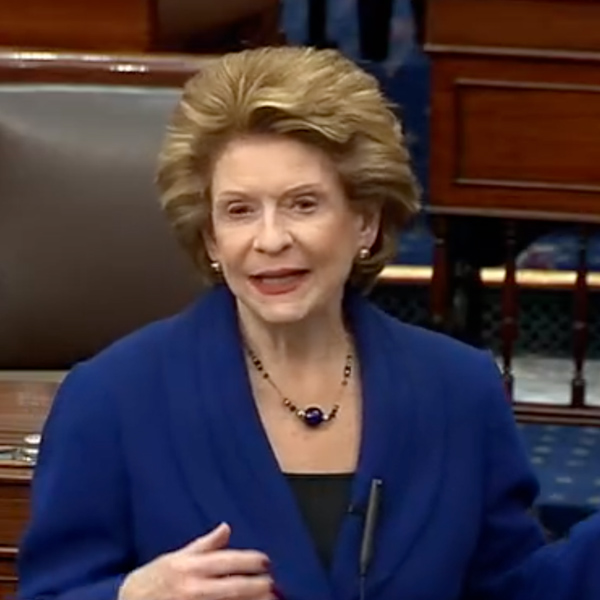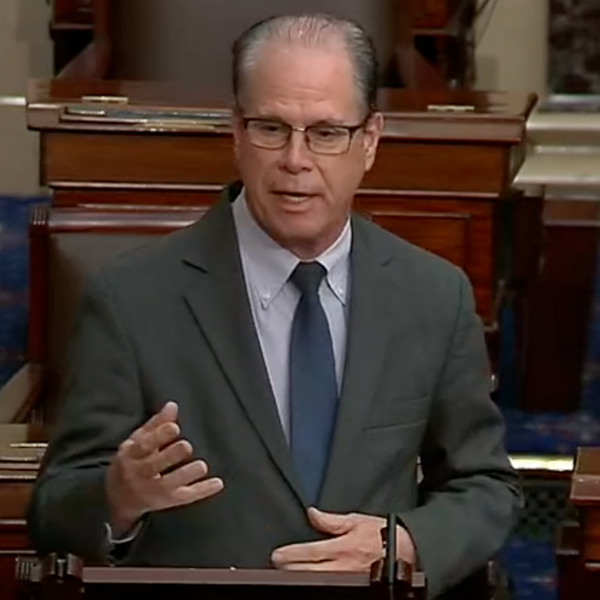The Inflation Reduction Act’s electric vehicle tax credits sparked a spirited debate on the Senate floor Thursday as Sen. Debbie Stabenow (D-Mich.) resisted Sen. Joe Manchin’s (D-W.Va.) call for swift passage of a bill that could put a hold on the credits for some EV buyers.
Manchin’s American Vehicle Security Act would force the Internal Revenue Service to put the IRA’s domestic content provisions into effect retroactively, as of Jan. 1. The IRA required the agency to issue guidelines for the tax credit by Dec. 31, but the IRS only issued partial guidelines, delaying action on the domestic content provisions until March and triggering Manchin’s efforts to force the agency’s hand. (See Treasury Delays Key Rules for IRA’s EV Tax Credits.)
In the interim, the IRS has said EV buyers can qualify for the full $7,500 tax credit offered in the IRA, without complying with domestic content rules. If Manchin’s bill were to become law, some of those cars might no longer qualify.
 Sen. Debbie Stabenow (D-Mich.) | C-SPAN
Sen. Debbie Stabenow (D-Mich.) | C-SPAN“Why the IRS did not do their job, I can’t tell you, unless their intent was never trying to comply with what we passed,” Manchin said, moving for his bill to skip a hearing in the Senate Finance Committee and go straight to a floor vote.
Framing the IRA as an “energy security manufacturing” law, Manchin said the domestic content provisions are intended to spur the buildout of a U.S. supply chain for EVs, countering China’s dominance in the EV global market.
“We’re moving rapidly into the EV markets — and I think, recklessly — as we were going into that before we were able to supply [domestic production] and be held captive by China,” he said. The U.S.’s main economic competitor now controls 80% of the world’s battery materials processing and 75% of lithium-ion battery production, he said.
Stabenow had no argument with Manchin on building out a domestic EV supply chain and cutting U.S. dependence on China. But she said the EV tax credit in the IRA “is confusing. It was not well vetted. It is not supported by anyone in the auto industry.”
Objecting to Manchin’s motion for a quick vote on the bill, Stabenow said, “This does not create any path for success for American automobile workers, for American automobile companies, for suppliers, for consumers who are interested in being able to purchase electric vehicles and benefit from a credit.”
She also defended the IRS decision to delay rules on the domestic content provisions as “not unreasonable. … They have been given, I believe, an incredibly complicated task to try to figure out how this consumer credit will work for consumers and for companies and workers,” she said.
The domestic content requirements simply don’t work “on a practical level,” she said.
The Senate recessed without acting on Manchin’s motion.
GOP Support Uncertain
Facing opposition from his fellow Democrats, the bill’s prospects for passage are slim. But Manchin is seeking GOP support, enlisting Rep. Mike Braun (R-Ind.) as a co-sponsor.
Backing up Manchin on Thursday, Braun said he had not supported the IRA. But he said the new bill “is not just about promoting our own manufacturing, which we need to do better generally. It’s also about not funding the human rights abuses of the Chinese Communist Party.”
 Sen. Mike Braun (R-Ind.) | C-SPAN
Sen. Mike Braun (R-Ind.) | C-SPANIndiana snagged a major EV battery manufacturing project in May, when Stellantis and Samsung announced plans to invest $2.5 billion in a plant in Kokomo. Delaying the domestic content provisions “sends a bad message to people in our own country about making the investments, and clearly in my own state, there’s a vested interest,” Braun said.
Whether other Republicans will sign on is less certain. Industry analysts ClearView Energy Partners said that even if some Republicans agree with Manchin’s focus on domestic manufacturing, they may be reluctant to sign on because the IRA also links some of its tax credits to “labor-friendly” provisions on prevailing wages and apprenticeships.
“Accordingly, we think Republicans may be leery of backing Manchin’s modification because it could be viewed as a tacit endorsement of the IRA,” ClearView said in an email note on Wednesday.
Opposition from the auto industry is almost certain, with many automakers already concerned about consumer and dealer confusion about the EV tax credit, according to John Bozzella, president of the Alliance for Automotive Innovation, an industry trade group.
“We want to make sure we don’t increase confusion for customers who might be confused already about what qualifies for a tax credit,” Bozzella said. “So I’m not quite sure what the value of the new legislation is.”
Placating Europe
The IRA’s $7,500 EV tax credit is broken down into two parts. Consumers purchasing a new EV may qualify for half the credit if the car’s battery components are at least 50% manufactured and assembled in the U.S. To qualify for the other half, 40% of the critical minerals in the battery, such as lithium or cobalt, must be sourced either in the U.S. or a country with which the U.S. has a free trade agreement.
The law also limits eligibility for the credit based on an EV manufacturer’s suggested retail price (MSRP) and a buyer’s annual income. The MSRP for EV sedans is capped at $55,000 and for SUVs, at $80,000. The income cap for individuals is $150,000 per year and for couples, $300,000 per year.
Beyond causing confusion at home, the EV tax credits and the IRS delayed guidelines on domestic content have also riled European automakers and their governments, who see the incentives as drawing vital investment dollars away from their countries. Despite being one of the U.S.’s major trading partners, the EU does not have a fair-trade agreement with the U.S., meaning its EVs would not quality for the tax credits.
Speaking at the Washington, D.C., Auto Show on Jan. 19, EU Ambassador Stavros Lambrinidis warned that the IRA could set off a “subsidy war” as both the U.S. and EU put billions into transportation decarbonization. (See Tracking the Contradictions of the US EV Market at the DC Auto Show.)
“That’s a danger because the IRA, the way it’s structured, in a sense is endangering investment in Europe. It is sucking away investment potential, especially at a time of very high energy prices,” Lambrinidis said. “Nothing could be worse for the strength of the U.S. economy and U.S. companies than a weak European economy.”
While still working on the domestic content guidelines, the IRS has an online list of EVs and plug-in hybrids it says are qualified for a $7,500 tax credit. Popular U.S. brands — including Ford’s F-150 Lightning, Chevy Bolt and Tesla’s Model 3 and Model Y — are on the list.
The IRS says many foreign automakers have “entered into a written agreement with us to become a ‘qualified manufacturer’ but [haven’t] yet submitted a list of specific makes and models that are eligible.”
The agency may have provided an opening for foreign models that are leased by individuals. In a recent fact sheet, the IRS identifies leased vehicles as eligible for the commercial EV tax credit, which is not subject to the domestic content requirements of the IRA.
The situation has been difficult for the White House, trying to move ahead with IRA implementation while also trying not to alienate the EU, where Manchin’s bill could be seen as adding more fuel to the fire.
But, in a now-divided Congress, Manchin does not have the leverage he had when Democrats controlled both houses and he was a key swing vote in the Senate.
“In the context of a divided Congress, however, the status quo puts [the IRS] in the driver’s seat,” ClearView said. “Not only does the administration have less to lose by overtly countering the Manchin bill, but the White House might be able to placate allies simply by staying silent and letting partisan divisions quash the measure.”




